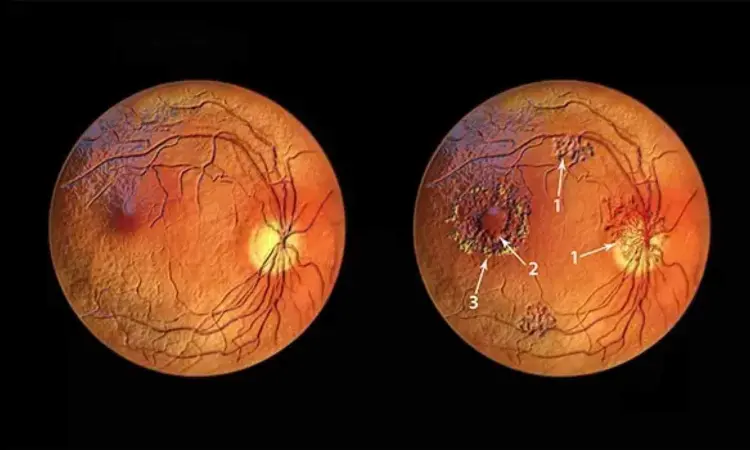- Home
- Medical news & Guidelines
- Anesthesiology
- Cardiology and CTVS
- Critical Care
- Dentistry
- Dermatology
- Diabetes and Endocrinology
- ENT
- Gastroenterology
- Medicine
- Nephrology
- Neurology
- Obstretics-Gynaecology
- Oncology
- Ophthalmology
- Orthopaedics
- Pediatrics-Neonatology
- Psychiatry
- Pulmonology
- Radiology
- Surgery
- Urology
- Laboratory Medicine
- Diet
- Nursing
- Paramedical
- Physiotherapy
- Health news
- Fact Check
- Bone Health Fact Check
- Brain Health Fact Check
- Cancer Related Fact Check
- Child Care Fact Check
- Dental and oral health fact check
- Diabetes and metabolic health fact check
- Diet and Nutrition Fact Check
- Eye and ENT Care Fact Check
- Fitness fact check
- Gut health fact check
- Heart health fact check
- Kidney health fact check
- Medical education fact check
- Men's health fact check
- Respiratory fact check
- Skin and hair care fact check
- Vaccine and Immunization fact check
- Women's health fact check
- AYUSH
- State News
- Andaman and Nicobar Islands
- Andhra Pradesh
- Arunachal Pradesh
- Assam
- Bihar
- Chandigarh
- Chattisgarh
- Dadra and Nagar Haveli
- Daman and Diu
- Delhi
- Goa
- Gujarat
- Haryana
- Himachal Pradesh
- Jammu & Kashmir
- Jharkhand
- Karnataka
- Kerala
- Ladakh
- Lakshadweep
- Madhya Pradesh
- Maharashtra
- Manipur
- Meghalaya
- Mizoram
- Nagaland
- Odisha
- Puducherry
- Punjab
- Rajasthan
- Sikkim
- Tamil Nadu
- Telangana
- Tripura
- Uttar Pradesh
- Uttrakhand
- West Bengal
- Medical Education
- Industry
Diabetes Patients with RVO and Prior CME at higher risk of Macular Edema After Cataract Surgery: Study

A recent study published in the Indian Journal of Ophthalmology has identified significant risk factors for postoperative macular edema (PME) following cataract surgery in patients with retinal vein occlusion (RVO).
The study found that patients with a history of cystoid macular edema (CME) requiring intravitreal treatment and those with diabetes are at a notably higher risk of developing PME after uneventful cataract surgery.
The retrospective study analyzed 162 eyes from 162 RVO patients who underwent cataract surgery between January 2015 and December 2019. Patients were followed for an average of 13 months post-surgery. The results indicated that PME developed within three months postoperatively in 40.1% of all eyes. Specifically, PME occurred in 21% of eyes without prior CME, 57.3% of eyes with prior CME, and 50% of eyes in diabetic patients.
Multivariate analysis revealed that diabetes increased the odds of developing PME by 2.1 times, while a history of CME requiring treatment raised the risk by 4.62 times. Additionally, prior anti-VEGF therapy was associated with a 4.83-fold increased risk. Although visual acuity improved significantly post-surgery-from 0.85 ± 0.55 logMAR at baseline to 0.365 ± 0.39 logMAR at final follow-up-eyes that developed PME had a higher likelihood of poorer visual outcomes, with many not achieving better than 6/18 vision.
These findings underscore the importance of preoperative risk assessment in RVO patients, particularly those with a history of CME or diabetes. The study recommends routine optical coherence tomography (OCT) scans during the first postoperative visit to detect early PME, enabling timely intervention to preserve visual acuity.
Dr. Shravani Dali has completed her BDS from Pravara institute of medical sciences, loni. Following which she extensively worked in the healthcare sector for 2+ years. She has been actively involved in writing blogs in field of health and wellness. Currently she is pursuing her Masters of public health-health administration from Tata institute of social sciences. She can be contacted at editorial@medicaldialogues.in.
Dr Kamal Kant Kohli-MBBS, DTCD- a chest specialist with more than 30 years of practice and a flair for writing clinical articles, Dr Kamal Kant Kohli joined Medical Dialogues as a Chief Editor of Medical News. Besides writing articles, as an editor, he proofreads and verifies all the medical content published on Medical Dialogues including those coming from journals, studies,medical conferences,guidelines etc. Email: drkohli@medicaldialogues.in. Contact no. 011-43720751


